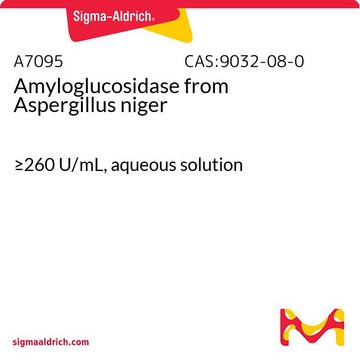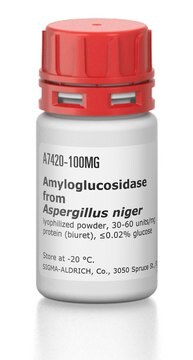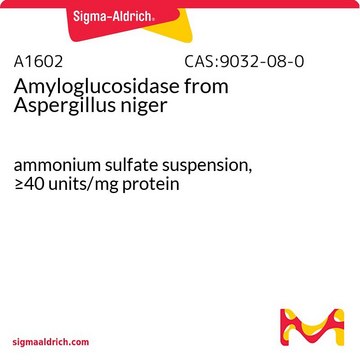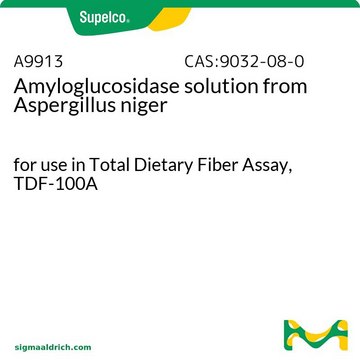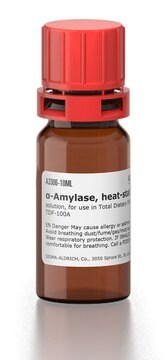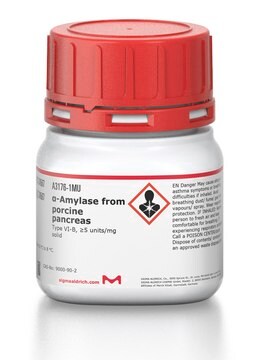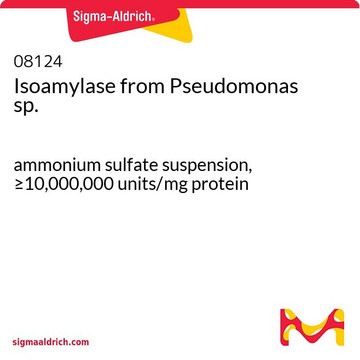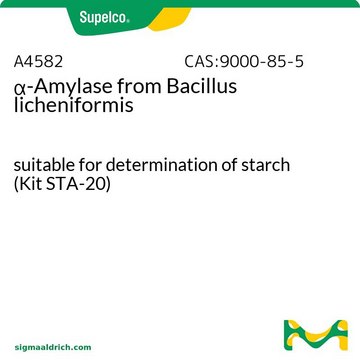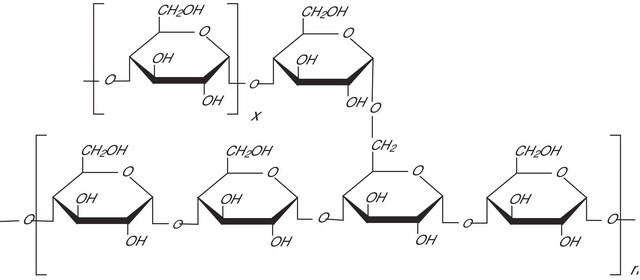10113
Amyloglucosidase from Aspergillus niger
powder, white, ~120 U/mg
Synonym(s):
1,4-α-D-Glucan glucohydrolase, Exo-1,4-α-glucosidase, Glucoamylase
Sign Into View Organizational & Contract Pricing
All Photos(2)
About This Item
Recommended Products
form
powder
specific activity
~120 U/mg
mol wt
Mr ~97000
greener alternative product characteristics
Waste Prevention
Design for Energy Efficiency
Learn more about the Principles of Green Chemistry.
sustainability
Greener Alternative Product
color
white
foreign activity
protease ≤0.1%
greener alternative category
, Enabling
storage temp.
2-8°C
Looking for similar products? Visit Product Comparison Guide
General description
We are committed to bringing you Greener Alternative Products, which adhere to one or more of The 12 Principles of Greener Chemistry. This product has been enhanced for energy efficiency and waste prevention when used in starch hydrolysis research. For more information see the article in biofiles.
Unit Definition
1 U corresponds to the amount of enzyme which liberates 1 μmol glucose per minute at pH 4.8 and 60 °C (starch, Cat. No. 85642, as substrate).
Other Notes
Synthesis of hetero-oligosaccharides by glucoamylase in reverse.
Signal Word
Danger
Hazard Statements
Precautionary Statements
Hazard Classifications
Resp. Sens. 1
Storage Class Code
11 - Combustible Solids
WGK
WGK 3
Flash Point(F)
Not applicable
Flash Point(C)
Not applicable
Personal Protective Equipment
dust mask type N95 (US), Eyeshields, Gloves
Choose from one of the most recent versions:
Already Own This Product?
Find documentation for the products that you have recently purchased in the Document Library.
Customers Also Viewed
R.A. Rastall et al.
Biotechnology Letters, 13, 501-501 (1991)
Yuping Chen et al.
Bio-protocol, 7(13), e2371-e2371 (2017-07-05)
Organisms store carbohydrates in several forms. In yeast, carbohydrates are stored in glycogen (a multi-branched polysaccharide) and in trehalose (a disaccharide). As in other organisms, the amount of stored carbohydrate varies dramatically with physiological state, and accordingly, an assay of
Tiziana Ventriglia et al.
Plant physiology, 148(1), 65-76 (2008-07-11)
ADP-glucose (Glc) pyrophosphorylase (ADP-Glc PPase) catalyzes the first committed step in starch biosynthesis. Higher plant ADP-Glc PPase is a heterotetramer (alpha(2)beta(2)) consisting of two small and two large subunits. There is increasing evidence that suggests that catalytic and regulatory properties
Lauren R Brewer et al.
Journal of agricultural and food chemistry, 60(17), 4379-4387 (2012-04-07)
To determine the rapidly digestible starch (RDS), slowly digestible starch (SDS), and resistant starch (RS) contents in a starch sample, the addition of amyloglucosidase is often used to convert hydrolyzates from α-amylase digestion to glucose. The objectives of this study
M I Nilsson et al.
Gene, 537(1), 41-45 (2014-01-05)
Pompe disease is a clinically and genetically heterogeneous autosomal recessive disorder caused by lysosomal acid α-glucosidase (GAA) deficiency. We report on two affected members of a non-consanguineous Caucasian family, including a classical infantile-onset patient with severe cardiomyopathy (IO) and his
Our team of scientists has experience in all areas of research including Life Science, Material Science, Chemical Synthesis, Chromatography, Analytical and many others.
Contact Technical Service